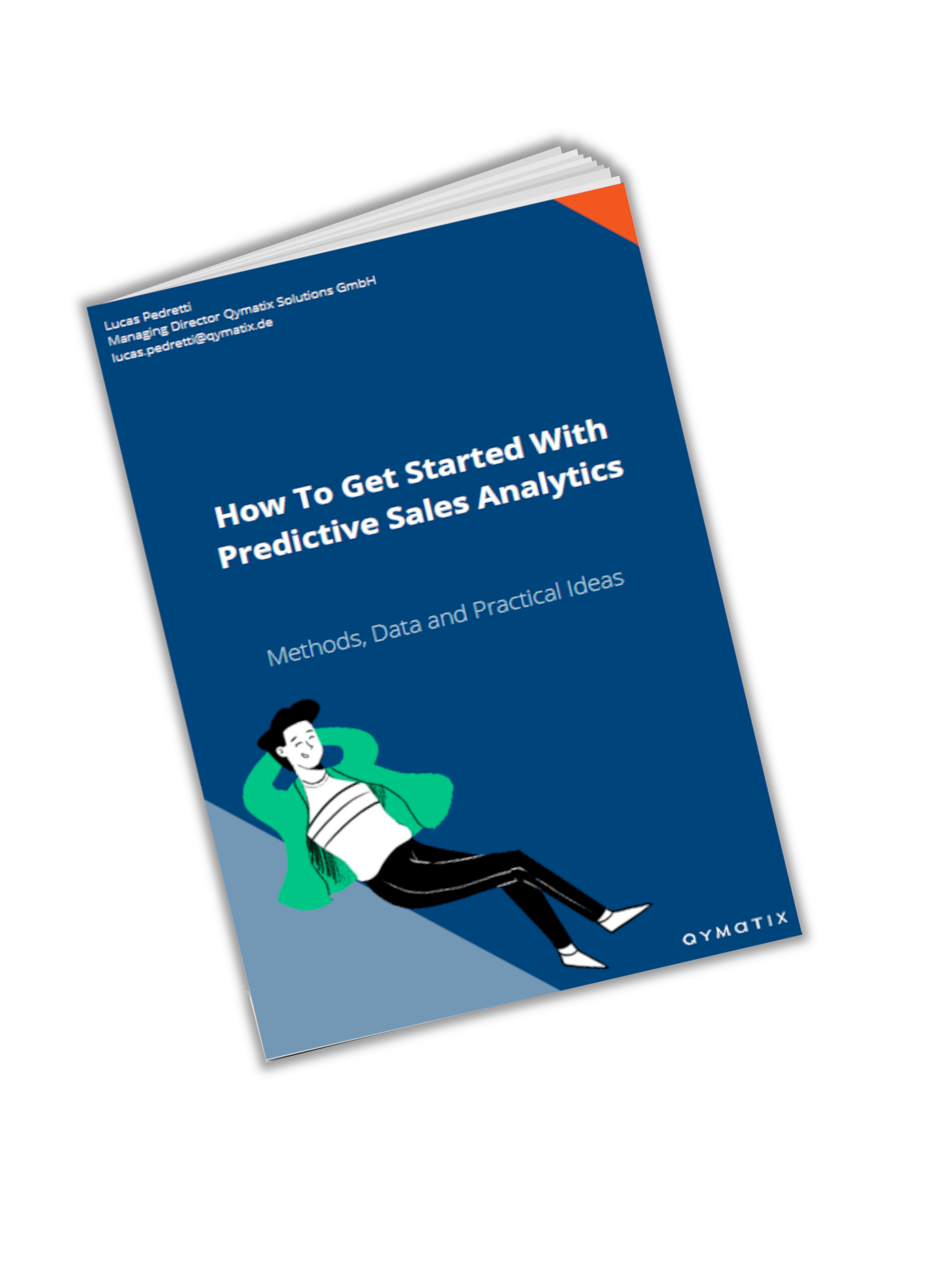B2B E-commerce Analytics: Why Predictive Analytics is now critical

Please enter your Email address
Predictive Analytics in B2B e-commerce has become decisive.
The sale of products and services via B2B platforms is on the rise. However, precisely because of the intense competition for comparable offers there, companies should automatically analyze their customer data to enable a personalized customer experience and identify churn risks.
For private consumers, buying online is ubiquitous. The Business-to-Consumer (B2C) sector is dominated by e-commerce platforms such as
Amazon, Zalando or booking.com, which are “open” 365 days a year, 7 days a week and 24 hours a day. Nobody would argue today that B2C online sales are critical.
The situation differs in Business-to-Business (B2B). Here, due to the ever-increasing digitalization, companies are under pressure to reorganize their structures and, accordingly, to digitalize them. This trend means also offering and selling products and services online.
Companies need to keep their digital sales operations in line with their competitors and customers by joining B2B platforms. B2B e-commerce platforms offer customers comparability of products and services on the global market. This openness, however, puts companies under increasing competitive pressure, mainly if they try to stick to traditional sales models.
The consumer behaviour of the younger generation (Generation Y) comes on top of the increasing importance of the new digital channels. This new buying-paradigm is shifting companies into assuming specific decision-making roles there, for example, in purchasing.
Generation Y shops online and has correspondingly essential requirements for the purchasing process, such as intuitive article search or efficient order processing. Successful B2B online platforms cater to this imperative.
How fast are B2B online platforms growing?
Do you think B2C e-commerce is big? According to a study by the global consulting and market research company Frost & Sullivan (2016), the market volume in B2C e-commerce will reach a level of 3,200 billion US dollars by this year.
In comparison, B2B e-commerce will represent more than double the B2C figure. There is unquestionably high potential for the B2B online market, a strong shift from offline to online. Above all, the market entry of experienced B2C players such as Amazon or eBay accelerated the growth of the B2B online business. It also intensified the competition for existing providers, according to the experts at Frost & Sullivan.
The future of B2B sales will live in B2B online platforms; this is a fact. That is because online trading or an e-commerce platform not only complements existing sales models but can also open new business areas and markets.
Regrettably, many companies do not yet have their e-commerce offer on their website. Those who sell their offer online create a permanent availability and increase the chance of winning new customers. However, this advantage is also a disadvantage, as customers find it easier to change providers on B2B platforms due to the greater comparability of products and services.
Six examples of B2B platforms
Alibaba
Alibaba is the largest trading platform in the world and is particularly important for trade within Asia. On Alibaba you will find manufacturers, suppliers, exporters, importers, buyers, wholesalers and products.
Europages
Europages is one of the largest providers of business contacts in Europe. The website contains data from several million suppliers, manufacturers, service providers, wholesalers, and retailers.
Industry Stock
Industry Stock is an industry portal with intelligent search engines for products and services, and it gears to the export-oriented industrial and commercial sector.
„Wer liefert was?“
„Wer liefert was?“ is a German supplier search engine. Here, decision-makers from the purchasing department search for suitable manufacturers, distributors, or suppliers.
esources
esources is a British B2B trade portal for wholesalers, suppliers, and products. Here companies search for British and international wholesalers, distributors, importers, exporters, manufacturers and agents and their offers.
Amazon Business
Amazon Business has also been online in Germany since 2016. With more than 100 million products for business customers, Amazon relies on a long-tail strategy in the B2B sector.
Acquire data from customers via e-commerce platforms
The growing B2B platforms threaten the classic B2B wholesale trade especially hard. After all, online trade means that typical intermediate stages on the way of a product from the manufacturer to the buyer, i.e. middlemen, are no longer necessary. The situation is similar in other industries, which can no longer expand their offline business without a sales engagement on online platforms.
Take the automotive industry, for example: companies in this sector often benefit from long-established structures with regular suppliers in the vicinity. These can deliver the necessary parts quickly. Geographical proximity and a strong sense of trust in the supplier are what make up the business relationship. Nevertheless, one cannot expect further growth with traditional sales structures.
Since many companies do not have their professional e-commerce website, B2B platforms offer a fitting opportunity to develop new customer groups without having to afford substantial investments individually.
However, it is not possible to acquire customers by merely having a presence and thus increasing visibility in the market. The competition on B2B platforms is fierce, and the offers are often similar. The question arises how companies can achieve competitive advantages under these conditions. The answer: Through a detailed analysis of their customer data.
“It is important to know the customer exactly and to integrate into their world of experience. Working on and with B2B marketplaces improves this by collecting valuable data about the customer, which you can use in a more targeted manner,” says Christian Koeper, COO of the automotive B2B platform Tyre24.
CALCULATE NOW THE ROI OF QYMATIX PREDICTIVE SALES SOFTWARE
Predictive analytics is also essential on B2B platforms.
Anyone involved in a B2B platform gains insights into the buying habits of their customers: Which brands do they buy? How often do they buy them? What does the classic shopping basket look like? Data-based answers to these sales-relevant questions are particularly important for the competition on these platforms. As mentioned above, many companies with the same or comparable offers are sometimes active on e-commerce platforms.
“Data-based answers not only make it easier for companies to plan their sales but also provide predictive models for future customer behaviour. The knowledge of product preferences leads to the possibility of offering offers that are specifically tailored to the customer,” adds Christian Koeper.
With methods such as predictive analytics, companies can make the best possible use of their sales data for personalized customer experience. Based on artificial intelligence, firms can analyze sales data and gain valuable insights for cross-selling and up-selling opportunities or customer attrition. Conversely, the same applies to companies that do not engage in B2B platforms using offline ERP and CRM data.
This current year will be the year of e-commerce in B2B, according to the common credo of experts. New and changing demands will be placed on B2B sales to deal with their customers in a more targeted manner and to expand their range of products and services to various platforms.
How relevant is this topic for you? Tell us below!
CONTACT US TODAY FOR YOUR PERSONAL CALL
Free eBook for download: How To Get Started With Predictive Sales Analytics – Methods, data and practical ideas
Predictive analytics is the technology that enables a look into the future. What data do you need? How do you get started with predictive analytics? What methods can you use?
Download the free eBook now.
- We will use this data only to contact you for discussing predictive sales KPIs. You can read here our declaration on data protection.


